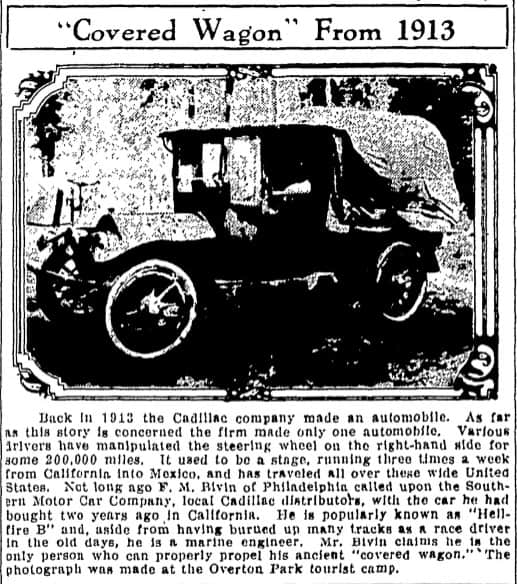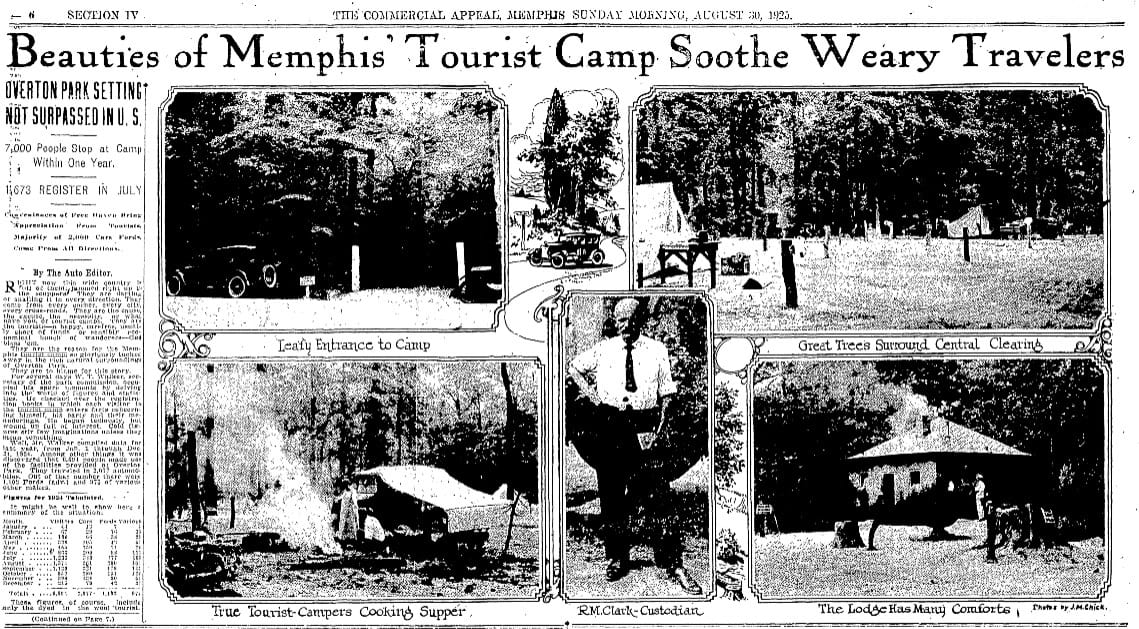Stories: “Beauties of Memphis’ Tourist Camps Soothe Weary Travelers”
The following is a transcript of a Commercial Appeal story from 1925 about the vehicle tourist camp that was installed in the Old Forest in the 1920s. For background on the Overton Park tourist camp, click here.
The Commercial Appeal
Sunday, August 30, 1925
Beauties of Memphis’ Tourist Camp Soothe Weary Travelers
Overton Park Setting Not Surpassed in U.S.
7,000 People Stop at Camp Within One Year
1,673 Register in July
Conveniences of Free Haven Bring Appreciation from Tourists, Majority of 2,000 Cars Fords, Come from All Directions.
By The Auto Editor
Right now this wide country is full of them, jammed right up to the scuppers. They are darting or snailing it in every direction. They come from every corner, every city, every cross-roads. They are the cause, the excuse, the necessity, or what have you, of tourist camps. They are the tourists–a happy, carefree, usually short of funds or sensibly economical bunch of wanderers–God bless ’em.
They are the reason for the Memphis tourist camp, so gloriously tucked away in the rich natural surroundings of Overton Park.
They are to blame for this story.
For several days W.T. Walker, secretary of the park commission, occupied his spare moments by delving into the world of figures and statistics. He checked over the registration books in which each visitor to the tourist camp enters facts concerning himself, his party and their meanderings. He began tediously, but wound up full of interest. Cold figures stir few imaginations unless they mean something.
Well, Mr. Walker compiled data for last year, from Jan. 1 through Dec. 31, 1924. Among other things it was discovered that 6,894 people made use of the facilities provided at Overton Park. They traveled in 2,077 automobiles. Out of that number there were 1,103 Fords (adv.) and 975 of various other makes.
Figures for 1924 Tabulated.
It might be well to show here a summary of the situation:
| Month | Visitors | Cars | Fords | Various |
| January | 44 | 12 | 7 | 3 |
| February | 67 | 29 | 16 | 13 |
| March | 180 | 66 | 38 | 28 |
| April | 326 | 105 | 48 | 57 |
| May | 455 | 150 | 71 | 76 |
| June | 633 | 200 | 88 | 112 |
| July | 1,333 | 310 | 177 | 163 |
| August | 1,371 | 361 | 200 | 161 |
| September | 1,120 | 321 | 178 | 143 |
| October | 852 | 280 | 154 | 126 |
| November | 398 | 134 | 80 | 54 |
| December | 215 | 79 | 42 | 37 |
These figures, of course, include only the dyed in the wool tourist. They take no cognizance of what is no doubt an even larger number of automobile travelers who stop at hotels and boarding houses. Nor are those complete campers included who choose their own campsites in the outlying sections and pitch their tents in full confidence that the world is theirs.
There is a lesson in the above figures. It is a lesson of good roads as well as of summer and winter driving. August shows out as the peak month. In that month all roads are readily passable, except under unusual circumstances. People are taking their vacations. They are going to see friends in other parts of the country. They are in the midst of their trips from coast to coast and from top to bottom of the land. In January, 1924, Memphis was more of less cut off from the rest of the world by gumbo mud and insurmountable barriers of bad roads. In December, 1924, conditions had improved. During the year, a great many stretches had been opened to automobile travel. Since then mile upon mile has been added and this winter will find motorists in Memphis in greater numbers than ever before. Their ranks will be further swelled beyond average proportions by the glow and glimmer pervading the whole Gulf Coast and Florida. People want to see that land of financial wonders; perhaps they can grab one end of the rainbow.
Season Now At Its Height.
Now we can get back on the main highway of this story. August was the biggest month in 1924. 1,371 visitors availed themselves of the advantages offered by the Memphis tourist camp. According to R.M. Clark, the gent who ministers to the wants of the city’s transient guests, the season is right now at its height. This month has been the most active since he took charge of the camp on Aug. 14, last year. Figures for this month cannot be had just yet. But July registrations show that 1,573 travelers stopped at the camp. That is 440 more than during the same month last year. Indeed, business is picking up. It would not be surprising to find that close to 2,000 came and went in August.
With all of those people requiring attention it is important to know just what facilities are provided for their comfort.
In the first place considerable thought was given to the choice of location when the camp was established by the board of park commissioners in 1923. It is in a well-shaded spot screened from public view, the coolest place in the park. It is readily accessible to all roads leading into Memphis and is reached by well-paved streets and highways.
The tract has been divided into 33 compartments, each 25 feet square, ample room for a good sized touring party with all their equipment. There is a double comfort station divided into two sections, with shower, bath, and toilet facilities for men and women. Likewise there are washtubs on both sides with boards and wringers attached. Hot and cold water is supplied.
 Electric Lights Kept Burning.
Electric Lights Kept Burning.
In every section of the camp electric lights have been so placed as to give sufficient illumination without causing glare and annoyance. By the means of them belated tourists may comfortably become located without danger of barked shins or worse, no matter at what hour of the night they arrive.
In addition to supplying water and electricity the commissioners wisely included firewood. There is always an abundance with which to cook or to warm chilled bodies. This provision does away with the temptation to chop down small trees or tear tender branches. The visiting campers quickly sense the pride which a beautiful spot inspires and co-operate to keep it beautiful.
Everything necessary is at hand for the comfort of the tourists. Of course there are some things which might well be added, but they are by no means essential. Among these would be a small commissary, where milk, butter and eggs, cigarettes and various odds and ends frequently required could be sold at a slight, though cumulative profit. At present the nearing shopping center is Binghamton.
Genial and diplomatic, courteous and firm is R.M. Clark, whose pleasure it is as custodian of the tourist camp to make as comfortable as possible each and every guest who seeks a space under his changing canopy of sky. He has police powers, but seldom finds it necessary to use them.
Quite as interested in the proper development of the camp is C.W. Davis, superintendent of parks; the commissioners, J.T. Willingham, Frank N. Fisher and A.L. Parker; and Secretary Walker. When the project was undertaken Mr. Walker’s position was held by Mr. O’Brien, now in charge of recreation activities for the city. Mr. O’Brien still retains his early contact with the strangers within Memphis’ limits and frequently drops in to pass the time of day with these birds of passage.
Houston Party Caught by Camera.
Typical of the motorists who find the Overton Park layout a welcome blessing is the party photographed while preparing supper. They are Mrs. A.J. Carroll and Mr. and Mrs. S.N. Ward of Houston, Tex. They were on the way home from Anniston, Ala., allowing four and a half days for the trip. Going east they headed considerably south of Memphis. They report the roads far better through this city.
While we stood talking to these happy Texans and looking over their camping equipment, adequate though not ponderous, cars swept in bearing license plates from California; Okmulgee, Okla.; Shreveport, La.; and Orlando, Fla. Mr. Clark greeted them affably.
Asked what was the largest carload he ever stood host to Mr. Clark surprised us by saying “Fourteen.” Noting our gasp and look of incredulity, he explained that the 14 had been touring the country in a truck.
“But there were 11 boys in a Ford,” he added, not to be backed down because of a mere truck.
This tale has rambled along quite a distance since Mr. Walker’s statistics were used. There are a few more interesting points in that connection. Taking September a year ago as a sample and not attempting to list the whole month, we find cars at the camp from Arkansas, Kentucky, Louisiana, Ohio, Oklahoma, Tennessee, Michigan, Texas, Missouri, Illinois, Indiana, Alabama, California, Wisconsin, Florida, Wyoming, Iowa, North Dakota, Colorado, Kansas, Washington, Virginia, Utah, Georgia, New York, District of Columbia, Pennsylvania, Oregon, Idaho.
From “Heaven City,” Ill.
During that month a party registering from “Heaven City,” Ill., 11 strong, passed through in a Ford on the way to Mississippi. A Mississippi Ford boasted 10 passengers.
And, though the Ford is not a large car, it is wonderful to contemplate its capacity. Last year 3,550 people were conveyed here and away by Uncle Henry’s proud product. The dressier makes, large and small, had 3,334 passengers.
Included among the cars which rested in the camp that month may be named, in addition to the capacious Fords, Dodge, Studebaker, Buick, Paige, Chevrolet, Liberty Oldsmobile, Cadillac, Hudson, Oakland, Essex, Dort, Chandler, Maxwell, Gray, Star, Hupmobile Reo, Nash, Jewett, Overland, Stephens, Ford truck, Premier, Stoddard-Dayton and an Indian motorcycle.
They were going to all sorts of different places–and many were “just going.”
Probably there is no better way to wind up this dissertation than by quoting the written comment of three women from San Marcos, Texas, also from the month of September:
“This is one more good camping place. Anyone wishing any more conveniences than this camp affords would do well to remain at home in a rocking-chair. We especially like the compactness of the camp sites, with convenient access to water for a maximum number of people. The great beauty of the park is in its many tall trees, everyone of them is priceless. All of Overton Park is beautiful. Memphis is very hospitable in placing her tourist camp here. In a trip of 1,800 miles we have not seen a better camp than this, and we shall long remember with great pleasure both the camp and the friendly custodian.”




